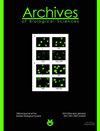rs780094和rs1260326葡萄糖激酶调节蛋白基因多态性与塞尔维亚急性缺血性脑卒中患者血脂异常的关系
IF 0.8
4区 生物学
Q4 BIOLOGY
引用次数: 0
摘要
尽管葡萄糖激酶调节蛋白基因(GCKR)的rs780094和rs1260326遗传变异可能与脂质谱失衡有关,但它们对急性缺血性卒中(AIS)风险的影响尚未确定。本研究旨在探讨GCKR单核苷酸多态性(snp) rs780094和rs1260326对AIS患者血脂参数的影响,并评价这些snp与AIS风险的相关性。在一项病例对照研究中,采用聚合酶链反应-限制性片段长度多态性(PCR-RFLP)方法对148名受试者进行GCKR rs780094和rs1260326 snp的筛选。根据血清总胆固醇(TC)、低密度脂蛋白胆固醇(LDL-C)、高密度脂蛋白胆固醇(HDL-C)和甘油三酯(TG)浓度测定脂质谱。与对照组相比,AIS患者中rs780094T和rs1260326T等位基因的频率显著降低。与野生型携带者相比,rs780094TT基因型和rs1260326TT基因型与AIS风险降低相关。综上所述,本研究首次表明rs780094和rs1260326纯合次要等位基因携带者的AIS风险降低不是由血脂异常引起的,而可能是由于凝血因子糖基化不足引起的。本文章由计算机程序翻译,如有差异,请以英文原文为准。
Association of rs780094 and rs1260326 glucokinase regulatory protein gene polymorphisms with dyslipidemia in a group of Serbian acute ischemic stroke patients
Although genetic variations rs780094 and rs1260326 of the glucokinase regulatory protein gene (GCKR) could be associated with lipid profile imbalance, their influence on acute ischemic stroke (AIS) risk has not yet been established. The aim of this study was to investigate the influence of GCKR single nucleotide polymorphisms (SNPs) rs780094 and rs1260326 on lipid profile parameters in patients with AIS, and to evaluate the association of these SNPs with the risk of AIS. In a casecontrol study, a total of 148 subjects were screened for GCKR rs780094 and rs1260326 SNPs using the polymerase chain reaction-restriction fragment length polymorphism (PCR-RFLP) method. The lipid profile was determined based on serum total cholesterol (TC), low-density lipoprotein cholesterol (LDL-C), high-density lipoprotein cholesterol (HDL-C) and triacylglycerol (TG) concentrations. The frequencies of the minor rs780094T allele and the minor rs1260326T allele were significantly lower in AIS patients compared to controls. The rs780094TT genotype and the rs1260326TT genotype were associated with decreased risk of AIS compared to wildtype carriers. In conclusion, this is the first study implying that decreased risk of AIS in rs780094 and rs1260326 homozygous minor allele carriers is not caused by dyslipidemia, but possibly by the lack of coagulation factor glycosylation.
求助全文
通过发布文献求助,成功后即可免费获取论文全文。
去求助
来源期刊
CiteScore
1.40
自引率
0.00%
发文量
25
审稿时长
3-8 weeks
期刊介绍:
The Archives of Biological Sciences is a multidisciplinary journal that covers original research in a wide range of subjects in life science, including biology, ecology, human biology and biomedical research.
The Archives of Biological Sciences features articles in genetics, botany and zoology (including higher and lower terrestrial and aquatic plants and animals, prokaryote biology, algology, mycology, entomology, etc.); biological systematics; evolution; biochemistry, molecular and cell biology, including all aspects of normal cell functioning, from embryonic to differentiated tissues and in different pathological states; physiology, including chronobiology, thermal biology, cryobiology; radiobiology; neurobiology; immunology, including human immunology; human biology, including the biological basis of specific human pathologies and disease management.

 求助内容:
求助内容: 应助结果提醒方式:
应助结果提醒方式:


